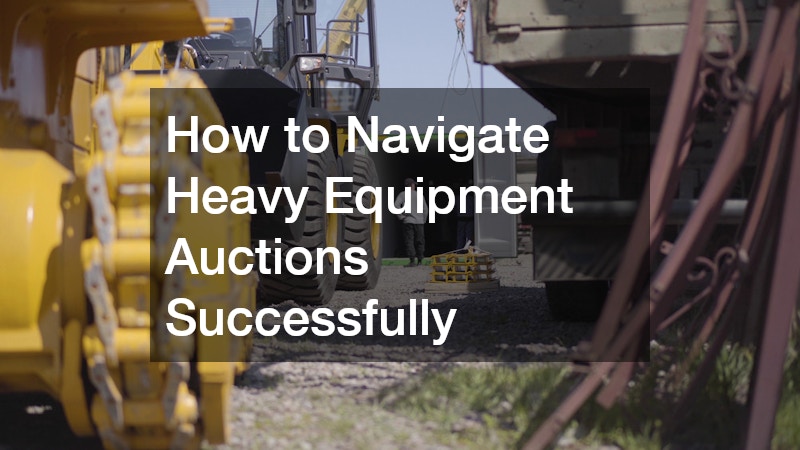
Participating in heavy equipment auctions can be a strategic move for businesses looking to acquire machinery at competitive prices. However, these auctions come with their own set of challenges and complexities. In this guide, we will explore effective strategies for navigating these auctions to ensure you come out on top.
Video Source
By understanding the auction process, setting clear objectives, and employing shrewd bidding tactics, participants can significantly enhance their chances of success. Whether a seasoned bidder or a newcomer, these insights will serve as a reliable roadmap to securing valuable equipment deals.
The first step to succeeding in heavy equipment auctions is understanding how these auctions work. Heavy equipment auctions can be live, online, or a hybrid of both, with each format having its nuances. In live auctions, participants gather to bid on equipment showcased at the venue, while online auctions allow for bidding from the comfort of your home or office. Hybrid auctions offer the best of both worlds by enabling bidders to participate both in person and online. Familiarity with the specific auction's format helps you better prepare and strategize your participation.
It is crucial to thoroughly read the auction rules and guidelines set by the auctioneer or organizing body. These rules often detail the terms of sale, bidding increments, and payment procedures. Understanding these elements in advance prevents any surprises or misunderstandings during the auction. Moreover, knowing the rules helps you align your bidding strategies with the auction's flow, increasing your chances of making successful bids. Such preparation ensures a smoother and more efficient auction experience.
Another essential aspect of understanding the auction process is getting familiar with the types of equipment being auctioned. Heavy equipment encompasses various categories, including construction machinery, agricultural equipment, and transportation units, each with its own specifications. Auction catalogs, usually available beforehand, contain detailed information and photographs of each item. Reviewing these catalogs meticulously aids in identifying the equipment that meets your needs, budget, and quality standards. This knowledge positions you to make informed decisions on auction day.
Success in heavy equipment auctions begins with setting clear and achievable objectives. Determine what specific equipment types you are interested in and gather all pertinent information beforehand. Establishing a clear budget is paramount, taking into account not only the bid amount but also buyers' premiums, taxes, and transportation costs. Clear financial boundaries prevent overbidding and preserve your capital for future investments. By setting precise goals, you can maintain focus and discipline throughout the auction.
It is also important to decide on the equipment's intended use before attending auctions. Whether you aim to expand your current fleet or replace outdated machinery, having a clear plan ensures you purchase equipment that aligns with your business needs. This foresight prevents costly impulse purchases that may not offer long-term value. Additionally, understanding the equipment's future utility within your operations can help in evaluating its cost-effectiveness and return on investment. Such a targeted approach enhances the overall strategic value of your acquisition.
Consider the long-term storage and maintenance needs of your acquired equipment, taking into account your existing facilities. Adequate planning for these logistics ensures you have the resources to incorporate new machinery seamlessly into your operations. It is advisable to consult with technicians or experts to assess compatibility issues or potential maintenance requirements before you bid. This level of preparedness can avert unnecessary expenditures and operational disruptions. By incorporating these considerations into your objectives, you reinforce the strategic merits of your auction participation.
Once you have a solid understanding of the auction process and have defined your objectives, it's time to focus on efficient bidding tactics. Start by researching past auction trends and market prices for your chosen equipment. Such insights help you determine a reasonable starting bid and forecast the likely competition you'll face for various items. Knowing the market value prevents you from overpaying and ensures your bids are rooted in practicality, even if the excitement of the live auction or competitive atmosphere starts to build.
Timing your bids is another crucial tactic to master in heavy equipment auctions. Jumping in too early might expose your interest in an item too soon, inviting counter-bids from competitors. Conversely, waiting too long increases the risk of missing out on a viable purchase. Striking a balance is key, often leveraging increments to assess the response from other bidders. This approach allows you to gauge the competition actively and adjust your strategy in real-time, enhancing your odds of securing the equipment at an advantageous price.
Additionally, consider forming strategic alliances with other attendees to pool resources or divide equipment lots. Such collaborations can leverage the collective purchasing power of multiple parties, allowing for more aggressive bidding. This could prove beneficial, especially when targeting expensive or rare machinery that might otherwise be out of reach. Furthermore, alliances offer opportunities to share insights and strategies, enriching both your network and tactical capacity. By approaching the auction with a calculated and open mindset, you position yourself for greater success.
